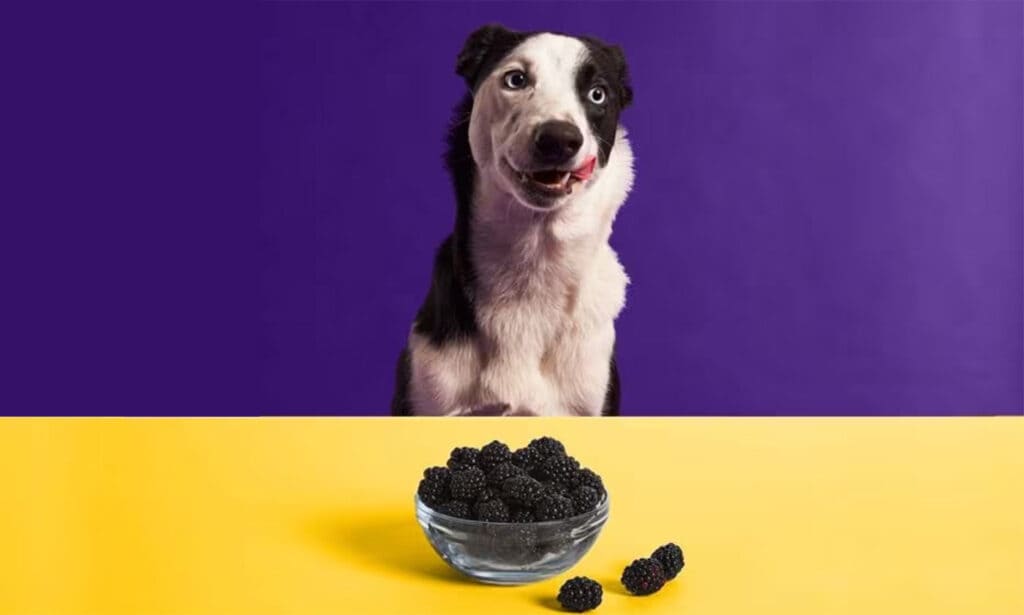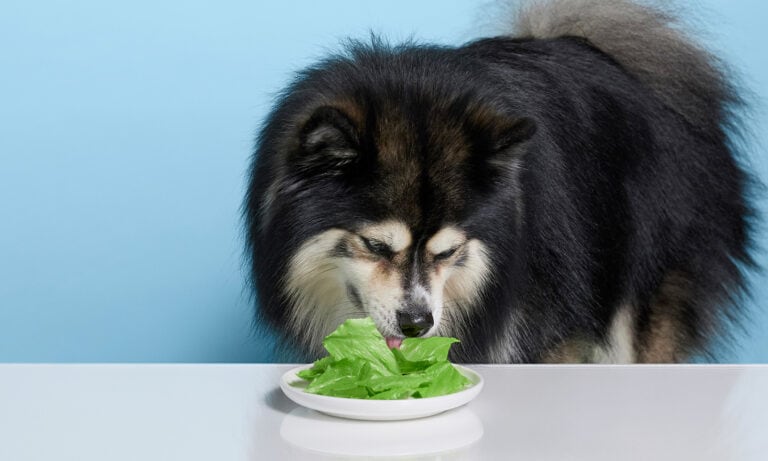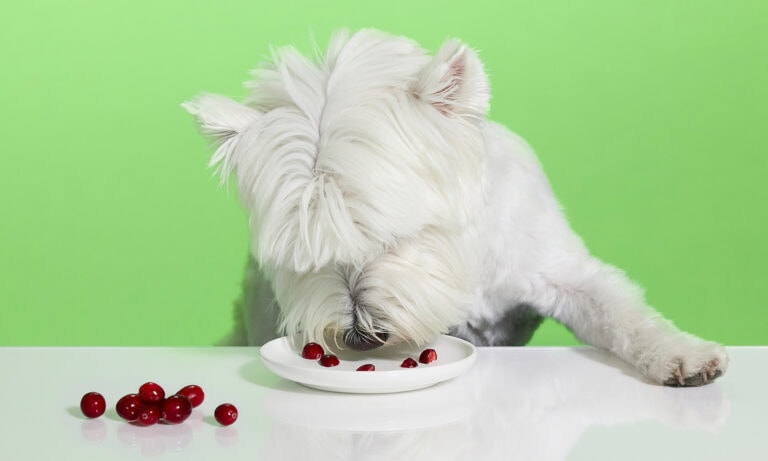Can dogs eat blackberries? Yes, they can! So long as you’re feeding your pup fresh blackberries without any added sugar, these naturally sweet, slightly tart berries are one of those human foods safe for dogs. Blackberries make a healthy treat or snack and are also an easy way to add fiber to your dog’s diet.
We spoke with Jamie Whittenburg, DVM, chief of staff of Kingsgate Animal Hospital in Lubbock, Texas, for tips and advice on how to include blackberries in your pup’s diet.
Always check with your veterinarian before introducing any new food into your dog’s diet.
In This Guide:
Are Blackberries Safe for Dogs?
Can dogs have blackberries? And are blackberries good for dogs? Yes, and yes! When fed in moderation, blackberries can provide your dog with several nutritional benefits.
Here are the health benefits of blackberries for dogs:
- High in fiber to keep your pup feeling fuller for longer
- High in water content for helpful hydration
- Rich in vitamin A, vitamin E, and vitamin K, which can not only support eye and skin health and cognitive function but also boost your dog’s immune system and maintain healthy skin and coat
- Contain omega-3 fatty acids that help support brain development, and heart and kidney health
- Boast minerals such as manganese, potassium, iron, and magnesium
- Have antioxidants (or anthocyanins) that help reduce inflammation and protect against diseases like heart disease and cancer
- Low in calories, which is helpful for dogs on a weight-loss or weight management plan
Are Blackberries Harmful to Dogs?
While blackberries are safe for dogs and can be delicious as a treat or mixed in with their regular food, blackberries can lead to gastrointestinal upset or be a choking hazard, among other risks.
Here are the downsides to feeding dogs blackberries:
- Gastrointestinal upset: Because of their high fiber content, blackberries can upset your dog’s digestive system. Keep an eye out for stomach pain, gas, diarrhea, or other gastrointestinal issues.
- Choking hazard: Whole blackberries can be a choking hazard for small dogs, so it’s important to cut the blackberries into smaller, bite-sized pieces, or to mash them.
- Contain trace amounts of xylitol: Xylitol is an artificial sweetener that’s highly toxic to dogs. Blackberries contain such a small amount that it shouldn’t cause any issues. However, it’s always better to be safe and feed this fruit in small amounts.
And because blackberries are rich in fiber, all that fiber could make your pup feel full, and it may discourage them from eating their regular food, which is an important part of their diet.
How Many Blackberries Can I Give My Dog?
You should always consult with your vet before serving blackberries to determine the right portion size for your dog. Even a healthy treat like blackberries should be factored into your dog’s optimum daily balanced diet.
Blackberries should be served as a treat and can even be offered up every day if factored into your dog’s vet-recommended daily calorie count. Treats should be no more than 10% of your dog’s daily diet; and because they contain sugar, blackberries need to be served in moderation.
How many blackberries you give depends on the size of your dog. Here are some general feeding guidelines:
Extra-small dogs (2–20 pounds)
1–2 blackberries
Small dogs (21–30 pounds)
2–3 blackberries
Medium dogs (31–50 pounds)
3–5 blackberries
Large dogs (51–90 pounds)
5–6 blackberries
Extra-large dogs (91+ pounds)
Small handful of blackberries
Remember, start with a small amount, and watch for any digestive system problems. Stop feeding your dog blackberries and contact your veterinarian if they have any of the following symptoms:
- Upset stomach
- Gas
- Vomiting
- Stomach gurgling (indigestion)
- Diarrhea
Before incorporating any new foods into your dog’s diet, always consult with your veterinarian to make sure it’s a safe addition to your pet’s diet given their health, diet needs, and current medications.
How To Safely Feed Blackberries to Your Dog
Here are some tips for safely preparing blackberries for dogs:
- Opt for fresh blackberries: And avoid wild blackberries and ones with added sugar content. It’s best to feed your dog fresh blackberries you’d find at the grocery store or farmer’s market. If you buy frozen blackberries, check the label to make sure they don’t contain added sugar content or artificial sweeteners like xylitol, which is highly toxic to dogs.
- Thoroughly wash them: As you would for yourself, thoroughly wash the blackberries before serving.
- Cut into bite-size pieces: Remember, blackberries can be a choking hazard for small dogs. Cut the blackberries into smaller, bite-size pieces.
Now that your blackberries are prepped, Dr. Whittenburg says fresh or unsweetened frozen blackberries can be:
- Fed individually as a treat
- A low-calorie dog food topper
- A healthy training treat for dogs who love them
Here are some dog treats with blackberries:
FAQs About Dogs and Blackberries
Q:Can dogs eat blackberry jam or jellies?
A:No, dogs should not eat blackberry jam because jams and jellies can be very high in sugar. And you should never feed your dog anything with xylitol, an artificial sweetener that is highly toxic to pups.
Q:What other berries can a dog eat?
A:
The following berries are safe for dogs to eat as a treat:
Q:What berries are toxic to dogs?
A:Grapes, raisins, and wild berries, like salmonberries, mistletoe berries, and holly berries, are toxic to dogs.
More human foods dogs can eat:
Share:














